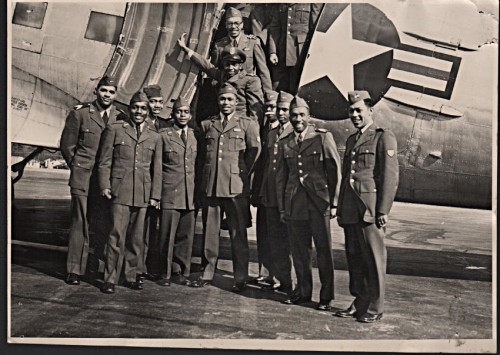
Students who attended Princess Anne College during World War II boosted the morale of their peers in the armed forces with an orchestrated letter-writing campaign.
It kept service members abreast of campus comings and goings – some mundane, others special. All reinforce the sense of patriotism the “greatest generation” famously embraced.
The correspondence also provides a snapshot of life on a historically Black campus well before it produced yearbooks starting in the late 1950s.
Letters addressed to “Son of P.A.C.” always set an understandably upbeat tone:
“November has been the most joyful 30 days of 1944 for the P.A.C. family due to your many responses to the last News Letter.”
“A Happy New Year to you. We hope to be able to express this wish in person in the year of 1946.”
“With the conclusion of the month of March comes the privilege of writing another bit of news from your home front.”
Letters also tended to include a spiritual message at the end:
“May He who is here, there and everywhere be with you and keep you safely.”
“Our hopes, our prayers are all with you and for you. So for another month, God’s care and protection be over you and keep you safe.”
“Keep the spirit of faith. From all reports it will not be long now and we are praying for your safe guidance through this storm.”
In between were a mix of harmless gossip and teasing, reports of engagements and babies born and descriptions of familiar academic, sporting and social activities.
P.A.C. students and faculty gathered food and gifts to give to the less fortunate at Christmastime, while “the families in town … were awakened by the resounding of the beautiful melodious voices telling the Christmas story in song by the College Choir.”
Letter writers called the college’s “Sandlot football eleven” the Trojanettes, which “entertained on the gridiron vs. the local community eleven and were victorious to the score of 12-6.” “Flash” Stansbury, “Shell” Cole and “Jive” Johnson were among the offensive stars.
Students apparently referred to the basketball team as the “Bone Crushers,” which played Greenwood High in Princess Anne and Worcester High, both all-black public schools. The “Crushers” also had games with St. Francis de Sales Catholic School from Salisbury, a team of “young white athletes.”
“The sportsmanship of both teams was fine. After the game, both teams were served by the (home economics) department by members of the Student Life Committee and three ‘H.E.’ girls. Before going home, our guests went to the recreation center for a jolly good time.”
Guest speakers who visited campus included Jefferson Davis Blackwell, president of Maryland State Teachers College in Salisbury, “nationally famous” educator Charlotte Hawkins Brown of the Palmer Institute and “All American Football star” Jerome “Brud” Holland.
Holland, who grew up in Auburn, N.Y. where abolitionist Harriett Tubman resettled after escaping slavery in Dorchester County, was the first black to play football at Cornell University in the 1930s. He was denied an opportunity to play professional football because of his race.
Nevertheless, Holland went on to become president of Delaware State (College) and later Hampton Institute — and served as ambassador to Sweden.
“… we are praying for your safe guidance through this storm.”
Charles H. Chipman, the widely respected principal of Salisbury’s Black high school, was a guest speaker of the Student Forum and delivered a talk in the spring of 1945 about “Post War Opportunities for the Negro.”
Professor Waldo Kiah’s son, Tommy, won a 1945 “baby contest” staged by the Faculty Wives’ Club, which held the event as a fund-raiser that netted $169.20.
“All around us … can be heard the call of farmers to teams at work in the fields, the hum of tractors preparing the soil for the sowing of seed for next winter’s pantry shelves. Spring is here.”
Correspondents urged the sons of P.A.C. to reciprocate: “Your letters do us a world of good and your pictures too. We venture to say that we are more anxious for news from you than you are for news from us.”
“In your various travels, let others know that the torch of enlightenment is held high at P.A.C. and influence them this way, thus build(ing) your Alma Mater larger and stronger.”
Letters courtesy of the family of John and Eunice Nichols

